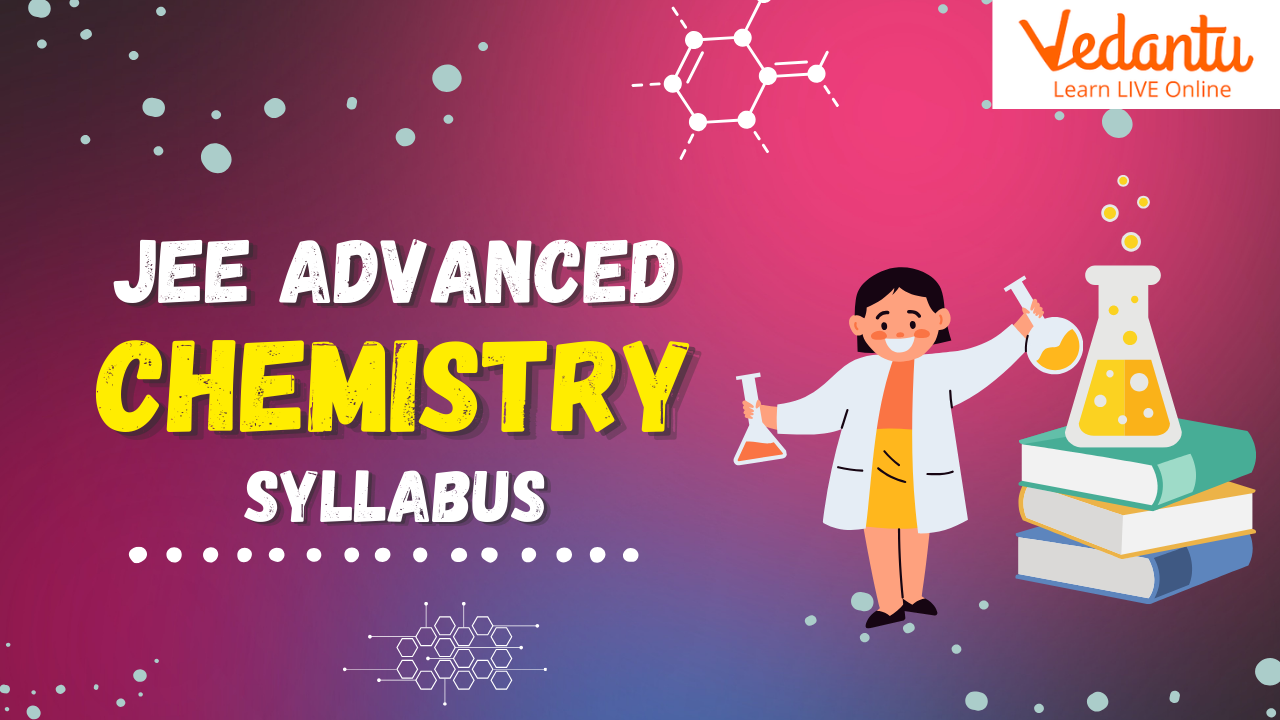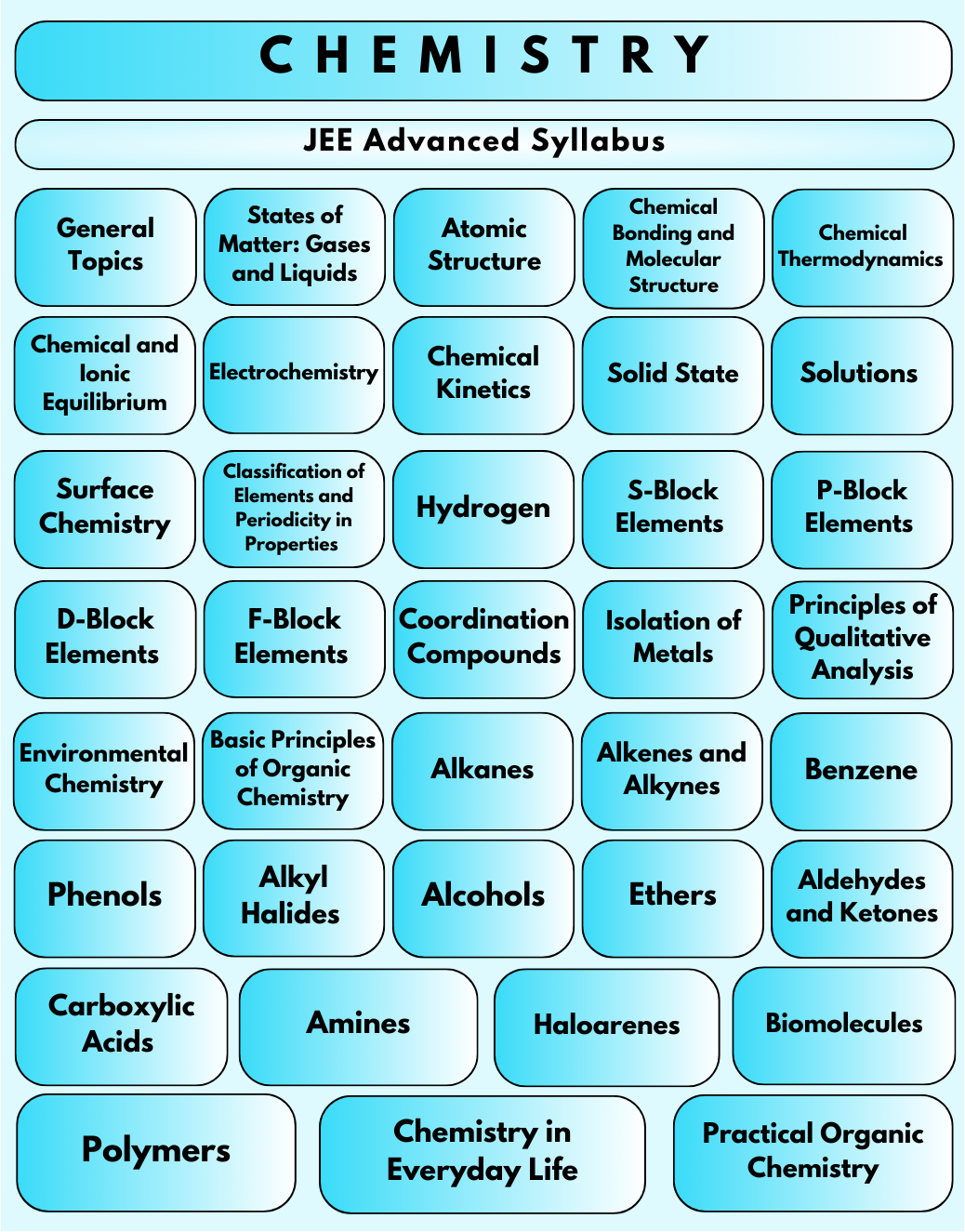JEE Advanced Chemistry Syllabus 2026: Download the Topic-Wise PDF with Weightage
FAQs on JEE Advanced Chemistry Syllabus 2026
1. Is it easy to score full marks in JEE Advanced Chemistry?
Scoring full marks in any subject, including JEE Advanced Chemistry, is extremely challenging. The exam is designed to test the very best students, and the questions are often very difficult and time-consuming. However, it is not impossible to score full marks in JEE Advanced Chemistry. With hard work, dedication, and the right approach, it is achievable.
2. What are the tips to prepare effective notes for JEE Advanced Chemistry?
Here are some tips to prepare effective notes for JEE Advanced Chemistry:
Use your own words: Don't just copy from the textbook or your teacher's notes. Use your own words to explain the concepts.
Be concise: Don't write down everything you hear or read. Focus on the key points and important concepts.
Use diagrams and illustrations: Diagrams and illustrations can help you to understand concepts more clearly.
Organize your notes: Use headings, subheadings, and bullet points to organize your notes.
Review your notes regularly: Review your notes regularly to refresh your memory and identify areas that you need to work on.
3. What are the important chapters to be focussed on in JEE Advanced Chemistry?
While all chapters are important for JEE Advanced Chemistry, some chapters are more heavily weighted than others. Here are some of the most important chapters to focus on:
Physical Chemistry: General Principles and Stoichiometry, States of Matter and Thermodynamics, Chemical Kinetics and Equilibrium
Inorganic Chemistry: Some Basic Concepts of Chemistry, Periodicity and s-Block Elements, p-Block Elements, d-Block Elements
Organic Chemistry: Fundamental Concepts of Organic Chemistry, Hydrocarbons, Organic Compounds Containing Halogen, Alcohol, Ether, Aldehyde, Ketone, Carboxylic Acid, Amines
4. How much time should I dedicate to preparing for JEE Advanced Chemistry?
The amount of time you need to dedicate to preparing for JEE Advanced Chemistry will vary depending on your starting point and your goals. However, it is generally recommended to start studying early and dedicate at least 3-4 hours per day to chemistry.
5. What are the challenges of preparing for JEE Advanced Chemistry?
The JEE Advanced Chemistry exam is a challenging exam that requires a significant amount of hard work and dedication. Some of the challenges of preparing for the exam include:
The vast amount of content to cover
The difficulty of the questions
The competition from other top-performing students
6. Where can I find the JEE Advanced Chemistry Syllabus PDF?
Vedantu provides the latest JEE Advanced Chemistry Syllabus PDF, which you can download for free to aid in your preparation.
7. Is there a specific JEE Advanced Inorganic Chemistry Syllabus?
Yes, the JEE Advanced Inorganic Chemistry Syllabus includes topics like Periodic Properties, Coordination Compounds, Metallurgy, and d- & f-block elements. Check Vedantu for a topic-wise breakdown.
8. Is the Chemistry Syllabus for JEE Advanced different from JEE Main?
Yes, the Chemistry Syllabus for JEE Advanced includes additional topics like Perkins Reaction, Nuclear Chemistry, and Equivalent Conductivity, which are not covered in JEE Main.
9. What are the best problem-solving strategies for JEE Advanced Chemistry?
To excel in JEE Advanced Chemistry, focus on conceptual understanding, solve previous years’ papers, and practice numerical problems daily.
10. What are the most important name reactions for JEE Advanced Organic Chemistry?
Some key reactions include Aldol condensation, Cannizzaro reaction, Perkin reaction, Gabriel synthesis, and Sandmeyer reaction.



























